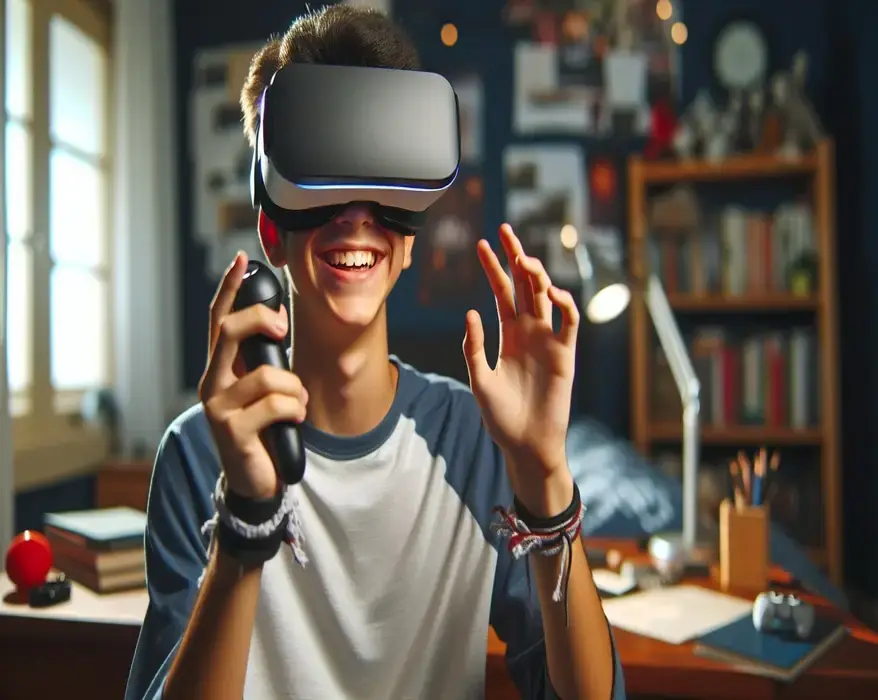Exploring the Use Cases of AR and VR in Real Estate Development
Virtual Reality (VR) and Augmented Reality (AR) have brought about a paradigm shift in multiple sectors, and the real estate domain is no different. These cutting-edge technologies provide immersive and interactive encounters. In this piece, we explore the inventive uses of VR and AR in the realm of real estate development AR and VR technology.
How are VR and AR Transforming the Real Estate Industry?
The adoption of VR and AR in the real estate industry brings forth a multitude of benefits. Moreover, real estate professionals can leverage these technologies to offer potential buyers immersive experiences like never before. Specifically, by using VR and AR, properties can be virtually staged and visualized, allowing clients to envision spaces more realistically.
Benefits of Using VR and AR in Real Estate
VR and AR technologies offer real estate agents a wealth of resources to create virtual environments.
As a result, these immersive experiences not only help facilitate informed decision-making but also allow clients to interactively visualize properties in a unique and engaging manner.
Also, Read here: https://entechonline.com/ar-vr-xr-and-mixed-reality-the-future-of-learning-science/
Immersive Experiences for Potential Buyers AR and VR technology
Through VR and AR, potential buyers can explore properties in a virtual realm, offering a sense of presence and immersion that traditional methods lack. This immersive experience not only captivates customers but also helps them connect with properties on a deeper level.
Virtual Staging and Visualization Tools
Virtual staging and visualization tools enable AR and VR technology real estate professionals to showcase properties in a dynamic and engaging manner. By creating virtual models and interactive walkthroughs, agents can provide customers with an in-depth understanding of the property, significantly enhancing the sales process.
What Are the Key Use Cases of VR and AR in Real Estate Business?
Virtual tours powered by VR technology have become a staple in the real estate business. Furthermore, these tours offer customers a comprehensive view of properties without the need for physical visits, saving time and resources for both buyers and sellers.
Real-time visualization of floor plans through VR allows potential buyers to customize spaces according to their preferences instantly.
Virtual Tours for Customer Experience
Virtual tours offer clients the convenience of remotely exploring properties. Additionally, using VR technology, potential buyers can virtually “walk through” homes, offices, or other real estate offerings, experiencing a realistic sense of space without the need for physical presence. Consequently, this improved customer experience simplifies the decision-making process and enhances overall customer satisfaction.

Utilizing VR for Real-time Visualization of Floor Plans
Real-time visualization of floor plans using VR technology offers a dynamic way of presenting properties to clients.
By immersing potential buyers in a virtual environment where they can interact with different layouts and designs, real estate agents can facilitate better communication and understanding, in order to bringing more successful property transactions.
AR Applications for Enhancing Reality Home Experience
Augmented Reality (AR) applications elevate home experiences by blending digital information with the real world. Furthermore, with AR, customers can see potential property renovations, decor choices, or upcoming developments in an interactive way. Consequently, this empowers them to make informed decisions using real-time visualizations.
How Can Real Estate Professionals Utilize VR and AR Technologies?
To maintain a competitive edge in the market, real estate professionals can utilize VR headsets in order to deliver captivating virtual presentations to clients. Moreover, by empowering realtors with VR technology, properties can be showcased not only in an engaging and immersive manner but also in a way that leaves a significant impression on potential buyers.
VR Headsets for Virtual Presentations AR and VR technology
Equipping real estate professionals with VR headsets not only enables them to provide clients with virtual showrooms that offer a 360-degree view of properties but also enhances the overall home-buying experience. Furthermore, these virtual showrooms help attract informed buyers while simultaneously creating a memorable experience that sets the property apart from the competition.
Creating Virtual Showrooms to Attract Informed Buyers
Virtual showrooms allow real estate agents to showcase properties in a visually stunning and interactive way.
By creating virtual environments that mimic physical spaces, agents can attract tech-savvy buyers who appreciate the convenience and immersive nature of VR and AR technologies AR and VR technology.

Time-Saving Benefits of Using VR and AR for Property Showcasing
One of the key advantages of utilizing VR and AR in real estate is the time-saving benefits it offers. With virtual property showcasing, potential buyers can explore multiple listings efficiently from the comfort of their homes, reducing the need for physical visits and streamlining the decision-making process for all parties involved.
Also, Read here: https://entechonline.com/augmented-reality-definition-examples-and-future-uses/
VR and AR Technologies in Making Informed Decisions in Real Estate?
Integrating VR and AR technologies into real estate marketing strategies provides a competitive edge by offering enhanced visualization and interactive experiences to clients. By using 3D modeling and VR experiences, real estate agents can present properties in a more engaging and memorable way, leading to increased sales and customer satisfaction.
Enhanced Visualization for Property Listings
VR and AR technologies enable real estate agents to create visually stunning property listings that captivate potential buyers. By incorporating interactive elements and virtual tours, agents can showcase properties in a way that goes beyond traditional photographs, providing customers with a more immersive and detailed view of the listings.
Interactive Virtual Models to Assist Real Estate Agents
Real estate agents can benefit from interactive virtual models generated through VR and AR technologies. These models offer a comprehensive view of properties, allowing agents to provide detailed information to clients and answer queries about layouts, designs, and potential modifications, ultimately enhancing the overall customer experience.
Also, read here: https://entechonline.com/creating-immersive-experiences-the-tech-behind-vr-and-ar-systems/
Boosting Sales with Immersive Customer Experiences
By integrating immersive customer experiences through VR and AR technologies, real estate agents can boost sales and foster long-term customer relationships. The ability to provide customers with memorable and engaging interactions, such as virtual property tours and interactive showcases, increases the likelihood of closing deals and securing satisfied clients.

Informed Decisions by AR and VR in Real Estate
VR and AR technologies play a crucial role in helping buyers and sellers make informed decisions by not only offering detailed visualizations but also providing immersive previews of properties. Moreover, through these technologies, real estate professionals can effectively simplify the decision-making process, significantly reduce time-consuming property inspections, and ultimately engage potential buyers in a more interactive and personalized manner.
Visualizing Renovation Plans and Property Changes
With VR and AR technologies, buyers can visualize potential renovations and property changes before making a purchase. Moreover, customers can understand customization and improvement options better by overlaying digital renderings onto real environments. Thereafter, this leads to more confident and informed decisions about property investments.
Engaging Potential Buyers with Immersive Property Previews
Immersive property previews powered by VR and AR technologies engage potential buyers on a deeper level. Real estate professionals use virtual tours and interactive experiences to engage clients. This approach helps clients fully understand the property’s features and amenities. Therefore clients can make decisions more quickly.
Reducing Time and Effort for Property Inspections with AR Solutions
AR solutions streamline the property inspection process by providing digital overlays of key information and details during walkthroughs. Moreover, by utilizing AR technology, real estate agents can offer clients a more efficient and comprehensive inspection experience. Consequently, this reduces the time and effort required for traditional property assessments and enhances overall customer satisfaction.

Given that, you might want to checkout our other insightful articles here.
FAQs
Q: What is the difference between AR and VR?
A: Augmented reality (AR) adds digital information to the real world. Virtual reality (VR) creates a fully immersive digital setting. In real estate, AR can enhance physical spaces with digital elements, whereas VR offers virtual property viewings and tours.
Q: How is VR utilized in real estate development?
A: VR in real estate allows potential buyers to experience properties remotely through virtual tours. This technology enables a realistic and interactive viewing experience, saving time and resources for both buyers and sellers.
Q: What are the benefits of using AR in the real estate industry?
A: Utilizing AR in real estate helps buyers visualize properties in a more interactive and engaging manner. AR applications can provide information overlays, virtual staging, and interactive 3D models, enhancing the overall property viewing experience.
Q: How can AR and VR technologies revolutionize real estate?
A:AR and VR technologies are transforming the real estate industry. Moreover, they offer immersive property showings, enable virtual staging, and provide interactive 3D models of properties. Consequently, these technologies enhance the buying experience and streamline the decision-making process for clients.
Q: What are AR apps for Real estate?
A: Yes, there are AR apps designed for real estate. These apps let users view properties in augmented reality. They can overlay digital information. Users can also visualize how furniture would look in the space before buying it.
Q: How can AR and VR create virtual tours for real estate properties?
A: Virtual and augmented reality technologies use 360-degree images to create immersive virtual tours. Additionally, they include interactive elements, allowing for virtual walk-throughs of properties. Henceforth, this technology offers a unique and engaging way to showcase real estate listings.
Q: Are VR Headsets Essential?
A: A virtual reality headset can improve the immersive experience. However, it is not essential for viewing VR real estate listings. Many VR experiences can be accessed through web browsers or mobile devices without the need for specialized equipment. They can be used in the mobile marketing event tours as well.
References
- Niki, K., et al. (2024). A real-time virtual outing using virtual reality for a hospitalized terminal cancer patient who has difficulty going out: A case report. Frontiers in Virtual Reality, 5. https://doi.org/10.3389/frvir.2024.1269707
- Sahray, K., et al. (2023). The implementation of virtual reality (vr) technology in real estate industry. PLANNING MALAYSIA, 21. https://doi.org/10.21837/pm.v21i27.1299
- Zhang, S., et al. (2024). Ar aircraft exterior inspection system based on visual slam technology. Springer Science and Business Media LLC. https://doi.org/10.21203/rs.3.rs-4942699/v1
Additionally, to stay updated with the latest developments in STEM research, visit ENTECH Online. Basically, this is our digital magazine for science, technology, engineering, and mathematics. Further, at ENTECH Online, you’ll find a wealth of information.






